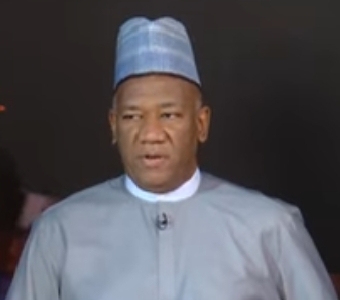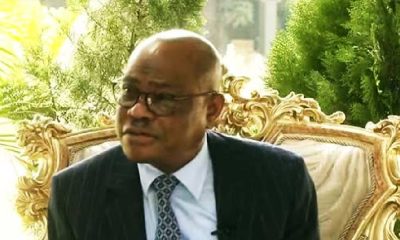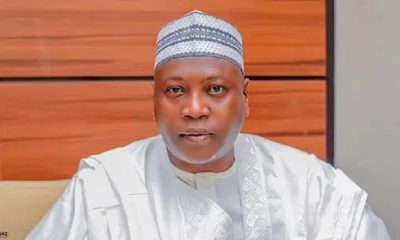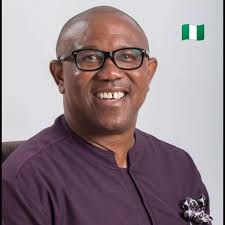News
Despite operational problems, NNPC Ltd’s state of emergency on crude oil production yields 1.61mbpd in July 2024

By Kayode Sanni-Arewa
The declaration of a state of emergency by the Nigerian National Petroleum Company Limited [NNPC Ltd] on crude oil production has yielded a positive outcome with the increase recorded in daily production from 1.25 million barrels per day [mbpd] in June to 1.61mbpd as of July 23, 2024.
Group Chief Executive Officer of NNPC Ltd, Mr Mele Kyari had declared the state of emergency at the end of June/early July in a speech at the 2024 Nigeria Oil and Gas (NOG) Energy Week in Abuja.
Mr Kyari said the move was directed towards increasing Nigeria’s crude oil production and growing its reserves.
According to him “We have decided to stop the debate. We have declared war on the challenges affecting our crude oil production. War means war. We have the right tools. We know what to fight. We know what we have to do at the level of assets. We have engaged our partners. And we will work together to improve the situation.”
He had explained that a detailed analysis of assets showed that Nigeria could conveniently produce two million barrels of crude oil per day without deploying new rigs, but the major impediment to achieving that remained the inability of players to act in a timely manner.
“War will help NNPC Ltd and its partners to speedily clear all identified obstacles to effective and efficient production such as delays in procurement processes, which have become a challenge in the industry,” he said.
And about a month after, the Nigerian Upstream Petroleum Regulatory Commission (NUPRC) has just announced the increase in the daily crude oil production in the country from 1.25 million barrels per day (mbpd) in June to 1.61 mbpd as of July 23rd.
The increment in output, according to the Commission, was in spite of significant operational challenges especially affecting terminals at Bonny, Brass, and Forcados, prompting the Commission to employ end-to-end production monitoring and a mass balance methodology to accurately account for losses and differentiate them from operational losses.
The announcement by the NUPRC has generated positive sentiments in the oil sector of the national economy with its potential for more revenue accretion to the federal government’s coffers.
Chief Executive Officer of the Commission, Engineer Gbenga Komolafe dropped the piece of good news at the House of Representatives’ Special Committee’s Two-Day Public/Investigative Hearing on Oil Theft/Losses in Abuja at the weekend.
An elated Komolafe said that Nigeria remained Africa’s largest producer of crude oil, boasting proven reserves of 37.50 billion barrels and a production capacity of approximately 2.19 million barrels per day (mbpd).
According to him: “Nigeria is facing significant challenges, especially affecting terminals at Bonny, Brass, and Forcados. This has prompted the Commission to employ end-to-end production monitoring and a mass balance methodology to accurately account for losses and differentiate them from operational losses.
“The NUPRC has introduced several innovative measures to enhance transparency and accountability.”
He listed other innovations towards accountability to include the Advanced Cargo Declaration (ACD) Regulation that ensures no crude oil is exported without proper accounting and that assigns a unique identification number (UIN) to each cargo; the Upstream Metering Regulation, which mandates reliable metering systems to account for all hydrocarbon production and exports; and, real-time cargo tracking and digital documentation to improve visibility and efficiency in cargo operations.
He explained that with a mandate to oversee the exploration, development, production, and lifting operations of crude oil and natural gas, “the NUPRC regulates both the technical and commercial aspects of operations in the nation’s Upstream Petroleum Sector, ensuring optimal tax revenue generation, royalty collection, and cost benchmarking.
“Other areas of major focus for the Commission include ensuring business continuity and production sustainability at low costs, accurate measurement and timely payment of royalties, uninterrupted crude oil and natural gas supply to the domestic market, and maintaining safety, health, and environmental standards.
“The Petroleum Industry Act 2021 grants the Commission several statutory mandates in the areas of calibration and certification of metering systems and equipment, publication of reports and statistics on upstream operations, regulatory oversight and issuance of quality and quantity certificates for exports, and determination of fiscal prices for crude oil and condensate.”
Komolafe stated that the strategies of the Commission aimed to optimise production, enhance regulatory oversight, and ensure accurate measurement and accounting.
He further said that the Commission had prioritised improving rig availability and reducing non-productive time through unlocking heavy crude oil reserves via industry workshops.
“These initiatives also support new Petroleum Prospecting License (PPL) awardees to achieve their first Oil, among other initiatives,” he explained.
He reaffirmed NUPRC’s commitment to continued engagements with stakeholders to optimise Nigeria’s Oil production and maintain its leadership position in Africa’s energy sector.Despite operational challenges, NNPC Ltd’s state of emergency on crude oil production yields 1.61mbpd in July 2024
The declaration of a state of emergency by the Nigerian National Petroleum Company Limited [NNPC Ltd] on crude oil production has yielded a positive outcome with the increase recorded in daily production from 1.25 million barrels per day [mbpd] in June to 1.61mbpd as of July 23, 2024.
Group Chief Executive Officer of NNPC Ltd, Mr Mele Kyari had declared the state of emergency at the end of June/early July in a speech at the 2024 Nigeria Oil and Gas (NOG) Energy Week in Abuja.
Mr Kyari said the move was directed towards increasing Nigeria’s crude oil production and growing its reserves.
According to him “We have decided to stop the debate. We have declared war on the challenges affecting our crude oil production. War means war. We have the right tools. We know what to fight. We know what we have to do at the level of assets. We have engaged our partners. And we will work together to improve the situation.”
He had explained that a detailed analysis of assets showed that Nigeria could conveniently produce two million barrels of crude oil per day without deploying new rigs, but the major impediment to achieving that remained the inability of players to act in a timely manner.
“War will help NNPC Ltd and its partners to speedily clear all identified obstacles to effective and efficient production such as delays in procurement processes, which have become a challenge in the industry,” he said.
And about a month after, the Nigerian Upstream Petroleum Regulatory Commission (NUPRC) has just announced the increase in the daily crude oil production in the country from 1.25 million barrels per day (mbpd) in June to 1.61 mbpd as of July 23rd.
The increment in output, according to the Commission, was in spite of significant operational challenges especially affecting terminals at Bonny, Brass, and Forcados, prompting the Commission to employ end-to-end production monitoring and a mass balance methodology to accurately account for losses and differentiate them from operational losses.
The announcement by the NUPRC has generated positive sentiments in the oil sector of the national economy with its potential for more revenue accretion to the federal government’s coffers.
Chief Executive Officer of the Commission, Engineer Gbenga Komolafe dropped the piece of good news at the House of Representatives’ Special Committee’s Two-Day Public/Investigative Hearing on Oil Theft/Losses in Abuja at the weekend.
An elated Komolafe said that Nigeria remained Africa’s largest producer of crude oil, boasting proven reserves of 37.50 billion barrels and a production capacity of approximately 2.19 million barrels per day (mbpd).
According to him: “Nigeria is facing significant challenges, especially affecting terminals at Bonny, Brass, and Forcados. This has prompted the Commission to employ end-to-end production monitoring and a mass balance methodology to accurately account for losses and differentiate them from operational losses.
“The NUPRC has introduced several innovative measures to enhance transparency and accountability.”
He listed other innovations towards accountability to include the Advanced Cargo Declaration (ACD) Regulation that ensures no crude oil is exported without proper accounting and that assigns a unique identification number (UIN) to each cargo; the Upstream Metering Regulation, which mandates reliable metering systems to account for all hydrocarbon production and exports; and, real-time cargo tracking and digital documentation to improve visibility and efficiency in cargo operations.
He explained that with a mandate to oversee the exploration, development, production, and lifting operations of crude oil and natural gas, “the NUPRC regulates both the technical and commercial aspects of operations in the nation’s Upstream Petroleum Sector, ensuring optimal tax revenue generation, royalty collection, and cost benchmarking.
“Other areas of major focus for the Commission include ensuring business continuity and production sustainability at low costs, accurate measurement and timely payment of royalties, uninterrupted crude oil and natural gas supply to the domestic market, and maintaining safety, health, and environmental standards.
“The Petroleum Industry Act 2021 grants the Commission several statutory mandates in the areas of calibration and certification of metering systems and equipment, publication of reports and statistics on upstream operations, regulatory oversight and issuance of quality and quantity certificates for exports, and determination of fiscal prices for crude oil and condensate.”
Komolafe stated that the strategies of the Commission aimed to optimise production, enhance regulatory oversight, and ensure accurate measurement and accounting.
He further said that the Commission had prioritised improving rig availability and reducing non-productive time through unlocking heavy crude oil reserves via industry workshops.
“These initiatives also support new Petroleum Prospecting License (PPL) awardees to achieve their first Oil, among other initiatives,” he explained.
He reaffirmed NUPRC’s commitment to continued engagements with stakeholders to optimise Nigeria’s Oil production and maintain its leadership position in Africa’s energy sector.
News
SAD! Popular Gospel singer, Big Bolaji is dead

Bolaji Adedotun Olanrewaju, popularly known as Big Bolaji, a Nigerian gospel singer, is died.
His family confirmed the unfortunate news in an official statement on Saturday.
Reports indicated that Big Bolaji slumped and died at the age of 50 at an event last night during a concert.
“It is with profound sadness that we announce the passing of Bolaji Olarewaju, affectionately known as ‘Big B,’ a cherished father, husband, brother, and an esteemed figure in both the church community, an ordained Pastor in the RCCG and a giant in the music industry and our community. Bolaji left us on Easter Saturday, 19th April 2025, after a brief illness,” the statement read.
“His departure leaves a void in our hearts that can not be filled.
“Bolaji’s life was a testament to his passion for music, his unwavering faith, and his dedication to uplifting those around him. His legacy is not only in the melodies he created but in the lives he touched and the unquantifiable joy he spread.”
They added, “We take solace in knowing that his absence with us is his presence with the Lord, and the indelible mark he left on all who had the privilege of knowing him will not be erased.
“As we navigate through this time of loss, we kindly request privacy to mourn as a family. We are deeply grateful for the outpouring of love and support we have received and ask that you continue to keep us in your prayers.”
The family also noted that funeral arrangements would be communicated at a later date.
“Details regarding the obsequies will be shared in due course as we come together to celebrate Bolaji’s remarkable life and legacy.
“Thank you for respecting our wishes during this incredibly difficult time.
“With gratitude,
“The Family of Bolaji Olarewaju,” the statement added.
News
Speaker Abbas Salutes Christians at Easter, Urges All To Emulate Selflessness of Jesus

News
2027 : “If You’re Truly Smart, Don’t Bother To Contest -Datti tells Tinubu

By Kayode Sanni-Arewa
Yusuf Datti Baba-Ahmed, the Labour Party’s 2023 Vice Presidential candidate, has urged President Bola Tinubu to reconsider seeking re-election in 2027, claiming it would be politically unwise.
Speaking on News program, Baba-Ahmed said Tinubu should “throw in the towel” if he is truly the savvy politician many believe him to be. He argued that the ruling All Progressives Congress (APC) has lost credibility, predicting their defeat in the next election.
Mocking Tinubu’s political maneuvers, Baba-Ahmed recounted how he backed various presidential candidates since 2007—culminating, in his words, in an “electoral heist” in 2023.
“If he’s that smart, it’s clear he’s going to lose in 2027,” he said, while suggesting that at least two candidates could defeat the president in the next poll.
He added that Tinubu, like former President Buhari, would fail to deliver on campaign promises. “Buhari didn’t develop Nigeria, didn’t provide security, didn’t fight corruption. Neither will Tinubu,” he asserted.
Baba-Ahmed expressed confidence that Nigerians will rise to reject bad leadership in 2027, uniting to bring genuine democracy to the country.
-

 News16 hours ago
News16 hours agoN300m gift: NBA under heavy hammer as FCT minister, Wike alleges body is compromised
-

 News5 hours ago
News5 hours agoSAD! Popular Gospel singer, Big Bolaji is dead
-

 News13 hours ago
News13 hours agoCriminals in military uniform kill 12 at cockfight
-

 News16 hours ago
News16 hours agoStop hunting in southern states, lawmaker begs Northerners
-

 News12 hours ago
News12 hours agoINSECURITY: Armed herders attack reportedy leaves family of eight dead, nine others
-

 News16 hours ago
News16 hours agoUK launches updated English tests for visa, citizenship applicants
-

 News8 hours ago
News8 hours agoEASTER:Let’s use this period to pray for compassionate leaders -Obi
-

 News12 hours ago
News12 hours agoCBEX: Ponzi scheme promoters face 10 years jail term, N20m fine





